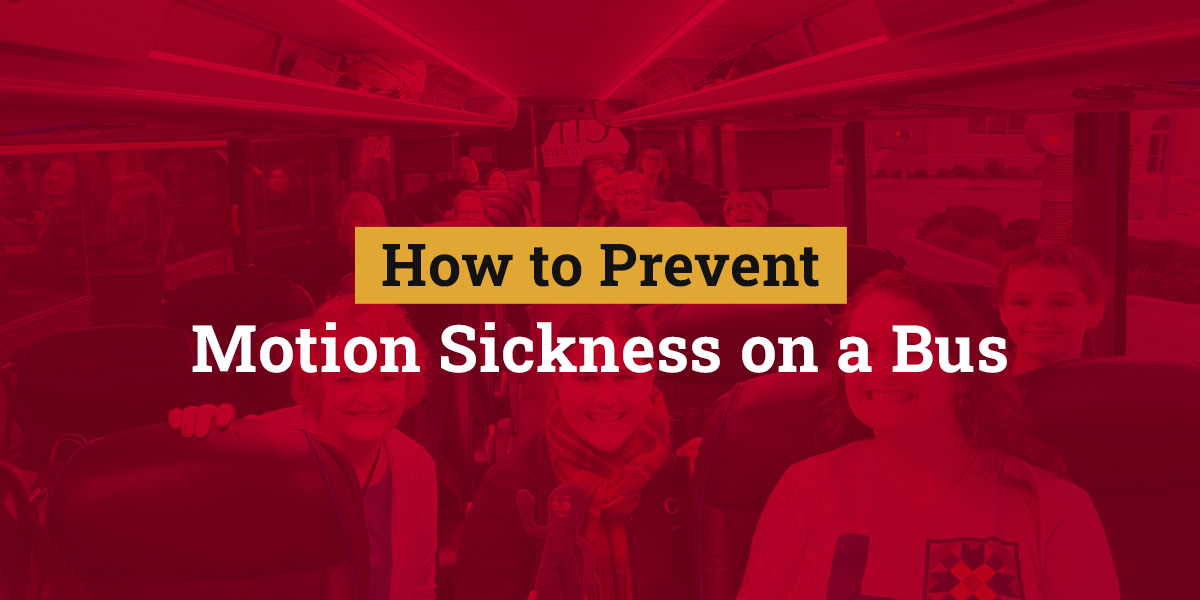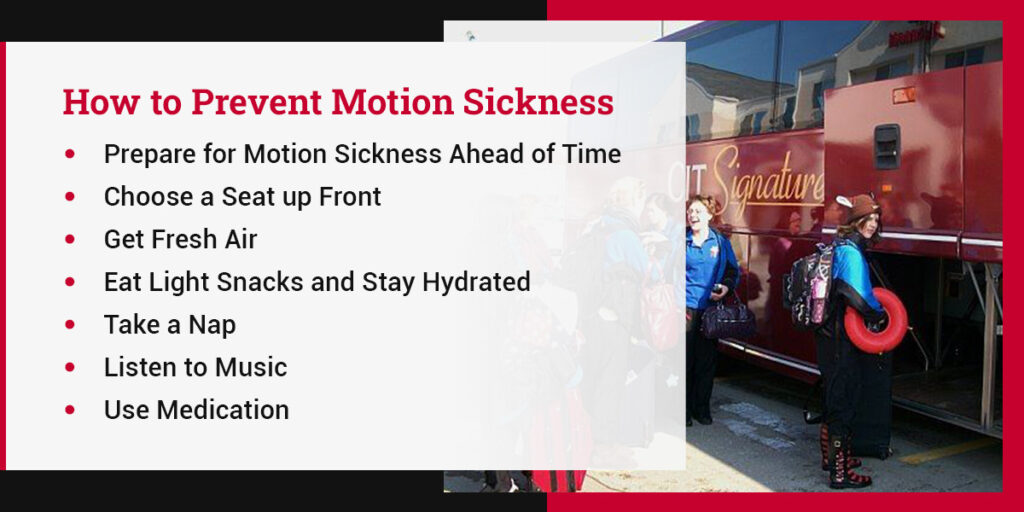
26 Sep How to Prevent Motion Sickness on a Bus
Imagine planning a scenic road trip for months, only to feel your head spinning with motion sickness halfway through the trip. While it is not life-threatening, taking the right measures before the trip will lessen the effects of motion sickness on a bus. There are also a few useful tricks that can help you ease the unpleasant feeling while traveling.
If you are one of the few people who has never experienced it, luck is on your side. However, motion sickness can affect just about anyone. Take a look at the causes of motion sickness and what you can do to make the most out of your journey.
What Is Motion Sickness?
Motion sickness makes you feel nauseous and lightheaded. It can happen when traveling by bus, car, train, plane, or boat. There have also been instances where it happens during carnival rides and rides at an amusement park.
Playing video games for hours at a time can also lead to motion sickness. The signals sent to the brain while gaming, paired with the visual effects, can leave gamers feeling nauseous and fatigued.
Once the motion stops, the sensation of sickness will likely abate fairly quickly. However, depending on how sick you feel, it can take anywhere between a few minutes to a few hours to feel better. If your sickness lasts for more than a few days, be sure to contact your doctor. They can prescribe medication that might clear up some of your symptoms.
What Causes Motion Sickness?
Motion sickness occurs when there are conflicting sensations among your senses. When you sit in a vehicle, your brain registers that you are moving. However, the sensations clash when you are in a seated or stationary position. Since the signals sent by your inner ear and the motion your body feels are different, your brain cannot process them. The resulting sensations are the unpleasant symptoms associated with motion sickness.
Common Symptoms of Motion Sickness
The level of motion sickness you can experience varies from person to person, as well as the symptoms. Apart from nausea and dizziness, common symptoms of motion sickness include:
- Vomiting
- Pale skin
- Cold sweat
- Headache
- Irritability
- Fatigue
- Increased saliva
- Feeling warm and feverish
- Hyperventilation
Who Is at Risk for Motion Sickness?
Anyone can get motion sickness while traveling. There are, however, people who are more at risk of suffering from motion sickness. Studies have found that motion sickness affects more women than it does men. Other who are at risk include:
- Children between the ages of 2 and 12
- Pregnant and menstruating women
- Patients suffering from migraines and vertigo
- Patients using certain medications

How to Prevent Motion Sickness
Make the most out of your travels using these helpful tips that can prevent motion sickness on a bus journey or other travel situations. Remember, each person is different and what works for one person might not always work for you. So, ensure that you have a few options handy that will help you along the way.
Prepare for Motion Sickness Ahead of Time
Take care of motion sickness before you hit the road. If you know you are more prone to getting sick while traveling, pack all the necessities you need to prevent any issues along the way. Stay clear of packing overstimulation activities such as games. Focus on the items that are most essential, such as:
- Medication
- Snacks
- Water
- Ice packs
- Extra clothes in case you get sick
Choose a Seat up Front
The best place to sit on a bus to avoid motion sickness is in front or as close as you can get to the driver’s seat. In the front, there is less movement from the bus that can make you sick. This will reduce the sensations and the risk of nausea and dizziness. Speed bumps or uneven roads can cause the bus to shake more, and the seats at the back will shake much more than those up front.
Get Fresh Air
If you start feeling sick, getting cold sweats or want to vomit on the bus, get some fresh air. If the bus driver is willing to stop so you can get out and catch a breeze, that’s great. But if you’re on the road, open a window to allow that fresh air to enter. Luxury charter buses have amenities such as air conditioning to help you cool down and feel refreshed.
Eat Light Snacks and Stay Hydrated
The risk of motion sickness can increase if you eat heavy, fatty foods or drink alcohol. You can avoid this by drinking plenty of water to stay hydrated and snack on the following food:
- Nuts
- Bananas
- Saltine crackers
- Apples
- Whole grain cereal
- Bread
Ginger can also provide relief from nausea and stomach aches, so it’s a good idea to have some ginger candies or tea on hand.
Take a Nap
With your brain and body on sensory overload, reduce the feeling of motion sickness by taking a nap. Recline the seat of your bus and get into a comfortable position. If you have a pillow on hand, use it for peak comfort. Even if you cannot fall into a deep sleep, close your eyes to avoid watching any moving objects or bright lights overhead.
Listen to Music
Music has an impact on how you feel. Upbeat music will leave you feeling energized whereas calming music will reduce stress. Create a playlist with soothing music filled with calm beats that will help you relax. This will block out any distractions around you and might even help you fall asleep to take a much-needed nap.
Use Medication
There are a few medications you can use to help with motion sickness. Before you head to the pharmacy, consult with your doctor first. They will be able to prescribe the best medication for you. If you find yourself on the road, there are a few over-the-counter options you can take:
- Scopolamine pills and patches
- Diphenhydramine
- Antihistamines
- Dimenhydrinate
- Cyclizine
If you have never used these medications before traveling, consult your doctor after the trip. This will ensure that you have taken the best option. Your doctor will also be able to tell you if you can continue the usage even after your trip if you ever experience motion sickness again.


Sorry, the comment form is closed at this time.